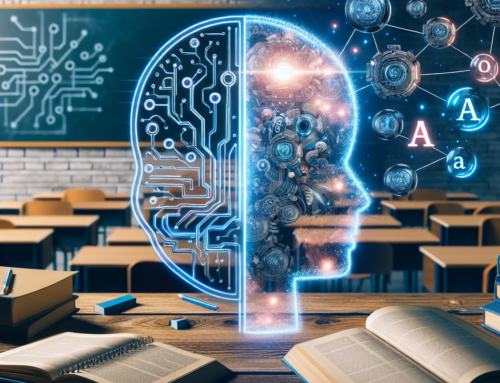As artificial intelligence continues to advance, ChatGPT has emerged as a powerful language model that can engage in convincing conversations with humans. With its ability to generate coherent and contextually relevant responses, ChatGPT has undoubtedly made a striking impact in various industries. However, this technological advancement has also raised concerns about its potential implications on the job market. This article explores the profound impact that ChatGPT has had on different professions and highlights the evolving dynamics between humans and AI in the workplace.
The Rise of ChatGPT
Definition of ChatGPT
ChatGPT, short for Chat Generative Pre-trained Transformer, is a state-of-the-art language model developed by OpenAI. It is an advanced artificial intelligence (AI) system that can engage in human-like conversations and provide responses in a natural language format. Built on the foundation of GPT-3, ChatGPT has undergone extensive training on a vast corpus of text and can generate coherent and contextual responses to a wide range of prompts. By leveraging deep learning techniques, ChatGPT attempts to mimic human conversation and assist users with their inquiries and tasks.
History and development of ChatGPT
The development of ChatGPT can be traced back to OpenAI’s groundbreaking work on language models, including GPT-1 and GPT-2. These models set the stage for the advancements demonstrated in GPT-3, upon which ChatGPT is built. OpenAI recognized the potential for language models to revolutionize various industries and enable more efficient human-computer interactions. Through ongoing research and rigorous fine-tuning, ChatGPT has emerged as one of the most sophisticated language models to date, with growing applicability in customer service, virtual assistants, and chatbot domains.
Potential Disruption to Existing Jobs
Automation of customer service roles
With its ability to understand and respond to user inquiries, ChatGPT has the potential to automate a significant portion of customer service roles. Businesses spend considerable resources on customer support, and ChatGPT offers an opportunity to streamline these operations. By integrating ChatGPT into chat systems, companies can provide instant and accurate responses to customer queries, minimizing the need for human intervention. This automation could potentially lead to a reduction in the number of customer service agents required, as ChatGPT takes on routine and repetitive tasks.
Impact on virtual assistants and chatbots
Virtual assistants and chatbots have become increasingly common in both consumer and business environments. These AI-powered tools are designed to assist users with tasks and provide information and support. ChatGPT’s arrival in the market presents both a challenge and an opportunity for existing virtual assistants and chatbots. On one hand, ChatGPT’s advanced conversational abilities may render certain traditional chatbots obsolete. On the other hand, virtual assistants and chatbots can leverage ChatGPT’s capabilities by integrating it into their systems, enhancing their conversational capabilities and responsiveness.
Changes in the demand for data entry and administrative tasks
Many jobs involve data entry and administrative tasks that require inputting information and managing records. As ChatGPT gains broader adoption, there is a possibility that these tasks could be automated or streamlined. ChatGPT’s natural language processing capabilities can potentially extract information from various sources and generate reports, reducing the need for manual data entry. This shift may result in a decreased demand for roles focused solely on data entry and administrative work, requiring individuals in these positions to adapt and acquire new skills.
New Job Opportunities
Emergence of AI trainers and developers
The rise of ChatGPT and similar language models prompts the need for AI trainers and developers. These professionals have the responsibility of training and fine-tuning the language model to ensure it performs optimally in various scenarios. AI trainers play a vital role in curating and preparing the data used for training, enabling ChatGPT to learn and improve from diverse inputs. Developers work on enhancing the capabilities of the language model and customizing its outputs based on specific business needs. With the increasing adoption of ChatGPT, the demand for AI trainers and developers is expected to rise significantly.
Increased need for chatbot designers
As businesses increasingly integrate ChatGPT into their chat systems, the role of chatbot designers becomes crucial. Chatbot designers are responsible for creating conversational flows and user experiences that align with a brand’s voice and objectives. They collaborate with stakeholders to define the scope and purpose of chatbots, map out potential conversation paths, and design user interfaces for seamless interactions. With ChatGPT’s advanced conversational abilities, chatbot designers must adapt their design strategies to leverage the AI model effectively. This new demand opens up opportunities for individuals skilled in chatbot design and user experience design.
Expansion of natural language processing roles
The rise of ChatGPT emphasizes the growing importance of natural language processing (NLP) skills in the job market. NLP specialists have expertise in understanding and processing human language, enabling them to design and improve language models like ChatGPT. These professionals work on tasks such as text classification, sentiment analysis, and language generation. With the increasing integration of ChatGPT in various industries, the demand for NLP specialists is expected to expand, as businesses seek to enhance their conversational AI capabilities and leverage natural language understanding for improved customer interactions.
Impact on Customer Experience
Improved efficiency and response times
One of the key benefits of integrating ChatGPT into customer service systems is the potential for improved efficiency and faster response times. Customers often seek quick resolutions to their inquiries and expect timely assistance. ChatGPT’s ability to generate intelligent and contextually relevant responses helps address customer queries promptly, eliminating the wait times associated with traditional support channels. With ChatGPT’s assistance, businesses can enhance the overall customer experience by providing swift and accurate responses, ultimately leading to higher customer satisfaction and loyalty.
Enhanced personalization and customizability
ChatGPT’s advanced conversational capabilities offer opportunities for enhanced personalization in customer interactions. By analyzing past conversations and customer data, ChatGPT can provide tailored recommendations and responses based on individual preferences and needs. This personalization can significantly improve the customer experience by making each interaction feel more individualized and relevant. Moreover, businesses can customize ChatGPT’s outputs to align with their specific brand voice and guidelines, ensuring consistency and reinforcing brand identity across all interactions.
Concerns regarding chatbot reliability and user frustration
While ChatGPT holds great promise, there are concerns regarding its reliability and the potential for user frustration. Language models like ChatGPT can sometimes generate responses that may be contextually accurate but lack common sense or result in incorrect information. Users may encounter instances where the AI-generated response fails to meet their expectations or misunderstands their inquiries. This can lead to frustration and dissatisfaction among users, as they may have to navigate through a series of queries before obtaining the desired outcome. Careful monitoring, continuous improvement, and user feedback loops are essential to address these concerns and maintain user trust.
Training and Implementation Challenges
Ensuring ethical use of ChatGPT in customer interactions
As businesses incorporate ChatGPT into their customer interactions, it is crucial to ensure ethical considerations are prioritized. The potential for bias, misinformation, and unethical usage exists in any AI-powered system, and ChatGPT is no exception. Steps must be taken to mitigate these risks and facilitate responsible use. Training the language model on diverse and representative data sets can help reduce bias and ensure fair treatment of users. Close monitoring, regular audits, and transparent disclosure of AI involvement are essential to maintain ethical use and safeguard user trust.
Addressing biases and stereotypes in AI language models
Language models like ChatGPT can inadvertently learn biases from the data on which they are trained. These biases can manifest in the form of gender, racial, or cultural stereotypes, leading to biased responses. Addressing and minimizing biases in AI language models is a crucial challenge that requires ongoing effort and collaboration. Organizations developing and deploying ChatGPT must invest in robust bias detection mechanisms, regular audits, and diverse training data to create more inclusive and equitable conversational AI systems.
Integration of ChatGPT with existing systems
Integrating ChatGPT into existing systems poses technical and logistical challenges. Businesses often have complex infrastructures and workflows, and incorporating ChatGPT seamlessly can be a complex task. Ensuring compatibility with existing software, training the model on domain-specific data, and managing the computational resources required for real-time interactions are critical considerations during the implementation process. Collaborative efforts between AI experts, system administrators, and developers are necessary to overcome these challenges and ensure a seamless integration of ChatGPT into existing systems.
Shifts in Skill Requirements
Higher importance of emotional intelligence and empathy
While ChatGPT excels at generating intelligent responses, it may lack the emotional intelligence and empathy that humans bring to conversations. As AI becomes more intertwined with customer interactions, the demand for emotional intelligence skills in human roles becomes heightened. Customer service agents, virtual assistants, and chatbot designers will need to augment their technical skills with emotional intelligence to provide empathetic and understanding support to customers. Training programs and initiatives that focus on enhancing emotional intelligence can help individuals in these positions adapt to the evolving demands of the job market.
Adaptation to working with AI-powered tools
The rise of ChatGPT and similar AI-powered tools necessitates a shift in skills and competencies for individuals in various roles. Employees across different industries will need to adapt to working alongside AI, leveraging its capabilities to augment their own performance. This adaptation involves learning how to collaborate effectively with AI systems, understand their limitations and potential biases, and optimize the use of AI-generated insights. Organizations should invest in training programs and initiatives to facilitate the integration of AI-powered tools into the workforce and empower employees to take full advantage of these technologies.
Critical thinking and creative problem-solving
As routine tasks become automated, the demand for critical thinking and creative problem-solving skills increases. Individuals armed with these skills can analyze complex situations, discern patterns, and generate innovative solutions. This adaptability is crucial in the context of ChatGPT, as there may be instances where the AI-generated response falls short or fails to address a customer’s unique needs. Customer service agents and chatbot designers, in particular, will need to leverage their critical thinking skills to navigate such scenarios and provide customized solutions that go beyond the capabilities of AI systems.
Economic Implications
Potential cost savings for businesses
The adoption of ChatGPT has the potential to generate significant cost savings for businesses. By automating routine tasks and reducing the need for human intervention in customer interactions, companies can optimize their resources and allocate them to higher value-added activities. The reduction in manual labor required for customer service roles, data entry, and administrative tasks can result in substantial cost savings over time. However, it is important to note that the implementation costs, including training the language model and integrating it into existing systems, should be carefully considered when evaluating the overall economic impact.
Potential job displacement and unemployment challenges
The rise of automation through language models like ChatGPT raises concerns about potential job displacement and unemployment challenges. As AI systems take over certain tasks, traditional roles may become obsolete or experience a reduced demand. This can result in job displacements, particularly for individuals in customer service, data entry, and administrative positions that can be automated by ChatGPT. The potential challenges of unemployment and skill mismatches should be taken into account by both businesses and policymakers to ensure a smooth transition for affected individuals.
Reskilling and upskilling initiatives
To mitigate the potential negative impacts on the job market, reskilling and upskilling initiatives are crucial. Businesses and governments should invest in programs that facilitate the transition of workers into roles that leverage emerging technologies, such as AI. Upskilling programs can equip individuals with the necessary skills to complement AI-powered tools like ChatGPT, enabling them to take on higher-value tasks that require a combination of technical proficiency and critical thinking. Such initiatives can help minimize job displacement and facilitate the adaptation of the workforce to the evolving demands of the AI-powered economy.
Ethical Considerations
Privacy concerns and data security
As ChatGPT engages in conversations, privacy concerns and data security become paramount. Users may share sensitive information during interactions, and it is imperative that businesses protect this data from unauthorized access or misuse. Data security measures, such as encryption and robust access controls, must be implemented to safeguard user information throughout the conversation. Transparent privacy policies and consent mechanisms should be in place to ensure users are aware of how their data is being used and to instill trust in the system.
Possible misuse of AI-generated content
Language models like ChatGPT have the potential for misuse, including the generation of malicious or harmful content. Organizations integrating ChatGPT into their systems must implement proactive measures to prevent the dissemination of false information or inappropriate content. Strengthening content moderation processes, empowering human oversight, and leveraging community feedback can help identify and mitigate misuse. Collaboration between AI developers, content moderators, and users is essential to maintain the integrity and safety of AI-generated content.
Accountability and transparency in AI decision-making
As AI systems like ChatGPT play a prominent role in customer interactions, ensuring accountability and transparency in decision-making becomes crucial. Users should have visibility into whether they are interacting with an AI system and have clear information on how its responses are generated. Honest disclosure of AI involvement, along with providing explanations or justifications for responses when requested, helps establish trust and transparency. Organizations should prioritize the design and implementation of AI systems that are explainable, allowing users to understand the rationale behind the AI’s actions and decisions.
Regulatory Frameworks and Legal Implications
Protection of user rights and safety
The integration of AI systems like ChatGPT into customer interactions necessitates the development of regulatory frameworks to protect user rights and safety. Governments and regulatory bodies should collaborate with AI developers and businesses to establish guidelines around data privacy, consent, and user protection. Legislation can ensure that AI systems operate within ethical boundaries and provide pathways for users to voice concerns or seek redress in the event of negative experiences or misuse. Striking a balance between innovation and user protections is critical to ensure the responsible and sustainable use of ChatGPT in customer interactions.
Liability for AI-generated actions or mistakes
Determining liability in the event of mistakes or harmful actions by AI systems poses legal challenges. ChatGPT, as a language model, does not have agency or intent; rather, it operates based on patterns learned from data. Establishing the responsibility for AI-generated actions requires careful examination of the roles and responsibilities of the system’s developers, trainers, and users. Legal frameworks addressing AI-related liability can help assign responsibility and protect individuals or businesses that may be adversely affected by AI-generated actions or mistakes.
Ethical guidelines and industry standards
The development and deployment of AI systems like ChatGPT necessitate the establishment of ethical guidelines and industry standards. These guidelines act as a compass for practitioners, developers, and businesses, ensuring responsible and ethical use of AI systems. Organizations such as OpenAI have already taken steps to create principles and guidelines for AI development and deployment. Collaborative efforts between industry stakeholders, regulatory bodies, and experts can result in comprehensive ethical frameworks that promote fairness, transparency, and accountability in the development and use of AI systems.
Future Outlook
Continuous advancements in AI language models
The future of AI language models like ChatGPT is poised for continuous advancements. AI researchers and organizations are constantly pushing the boundaries of natural language understanding and generation, working on models that exhibit human-like conversation and reasoning abilities. With each iteration, subsequent models are expected to demonstrate enhanced capabilities, reduced biases, and improved contextual understanding. These advancements will fuel the integration of AI language models into various industries, further transforming the way we interact with technology.
Collaboration between humans and AI
While AI language models like ChatGPT may automate certain tasks, collaboration between humans and AI remains vital. The human element brings emotional intelligence, empathy, and nuanced decision-making to conversations. AI systems can augment human capabilities, providing instant access to information, assisting with routine tasks, and handling high-volume inquiries. Striking the right balance between human and AI involvement leads to more effective and efficient customer interactions and empowers individuals to focus on complex and value-added aspects of their roles.
Broader societal implications and adaptation
As ChatGPT and similar AI systems become more integrated into our daily lives, broader societal implications and adaptations will arise. From reshaping workplace dynamics to influencing the way we communicate, the impact of AI language models goes beyond job roles and customer interactions. Society as a whole will need to adapt to these advancements, embracing the benefits while also addressing the challenges they pose. Education, legislation, and widespread awareness will play key roles in ensuring a responsible, inclusive, and sustainable integration of AI language models in the fabric of our society.








Leave A Comment